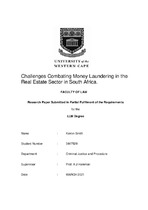| dc.contributor.advisor | Hamman, A J | |
| dc.contributor.author | Smith, Keiron | |
| dc.date.accessioned | 2021-08-18T11:34:43Z | |
| dc.date.available | 2021-08-18T11:34:43Z | |
| dc.date.issued | 2021 | |
| dc.identifier.uri | http://hdl.handle.net/11394/8354 | |
| dc.description | Magister Legum - LLM | en_US |
| dc.description.abstract | South Africa’s main anti-money laundering legislation consists of 2 pieces of legislation, namely: The Financial Intelligence Centre Act (FICA)1 and the Prevention of Organised Crime Act (POCA).2 Money Laundering is often defined as the concealment of funds or property which has been obtained as the result of unlawful activity. It is also defined as giving the unlawfully obtained funds the appearance of legality when in actuality the funds or property is obtained unlawfully. POCA defines unlawful activity which includes any criminal offence in South African law, whether it has occurred in South Africa or elsewhere.3 Any person who has the knowledge of the aforementioned money laundering act or ought to have the knowledge may be guilty of an offence. | en_US |
| dc.language.iso | en | en_US |
| dc.publisher | University of the Western Cape | en_US |
| dc.subject | Accountable Institutions | en_US |
| dc.subject | Assets | en_US |
| dc.subject | Conveyancers | en_US |
| dc.subject | Money laundering | en_US |
| dc.subject | Prosecution | en_US |
| dc.title | Challenges combating money laundering in the real estate sector in South Africa | en_US |
| dc.rights.holder | University of the Western Cape | en_US |

